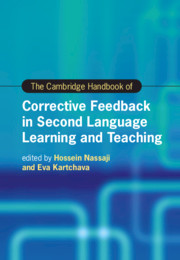Book contents
- The Cambridge Handbook of Corrective Feedback in Second Language Learning and Teaching
- Cambridge Handbooks in Language and Linguistics
- The Cambridge Handbook of Corrective Feedback in Second Language Learning and Teaching
- Copyright page
- Contents
- Figures
- Tables
- Contributors
- Acknowledgments
- Introduction Corrective Feedback in Second Language Teaching and Learning
- Part I Theoretical Perspectives on Corrective Feedback
- Part II Methodological Approaches in the Study of Corrective Feedback
- 5 Tools to Measure the Effectiveness of Feedback
- 6 Laboratory-Based Oral Corrective Feedback
- 7 Classroom-Based Research in Corrective Feedback
- 8 Meta-Analysis and Research Synthesis
- Part III Different Delivery Modes of Corrective Feedback
- Part IV Feedback Provider, Feedback Intensity, and Feedback Timing
- Part V Corrective Feedback and Language Skills
- Part VI Contexts of Corrective Feedback and Their Effects
- Part VII Learners’ and Teachers’ Feedback Perspectives, Perceptions, and Preferences
- Part VIII Individual Differences, Tasks, and Other Language- and Learner-Related Factors
- Index
- References
8 - Meta-Analysis and Research Synthesis
from Part II - Methodological Approaches in the Study of Corrective Feedback
Published online by Cambridge University Press: 26 February 2021
- The Cambridge Handbook of Corrective Feedback in Second Language Learning and Teaching
- Cambridge Handbooks in Language and Linguistics
- The Cambridge Handbook of Corrective Feedback in Second Language Learning and Teaching
- Copyright page
- Contents
- Figures
- Tables
- Contributors
- Acknowledgments
- Introduction Corrective Feedback in Second Language Teaching and Learning
- Part I Theoretical Perspectives on Corrective Feedback
- Part II Methodological Approaches in the Study of Corrective Feedback
- 5 Tools to Measure the Effectiveness of Feedback
- 6 Laboratory-Based Oral Corrective Feedback
- 7 Classroom-Based Research in Corrective Feedback
- 8 Meta-Analysis and Research Synthesis
- Part III Different Delivery Modes of Corrective Feedback
- Part IV Feedback Provider, Feedback Intensity, and Feedback Timing
- Part V Corrective Feedback and Language Skills
- Part VI Contexts of Corrective Feedback and Their Effects
- Part VII Learners’ and Teachers’ Feedback Perspectives, Perceptions, and Preferences
- Part VIII Individual Differences, Tasks, and Other Language- and Learner-Related Factors
- Index
- References
Summary
This chapter introduces the methodological tools of research synthesis in the context of corrective feedback (CF) research and highlights findings in this area generated by synthetic approaches. Meta-analysis, the most common approach to research synthesis in applied linguistics, has quickly gained much popularity in CF research, with at least twenty meta-analyses conducted on CF by the time of this publication (more than in any other area of applied linguistics research). The chapter describes the value of research synthesis to CF research and how meta-analyses have helped consolidate findings in this domain and provided insight into the range of moderating variables that may influence the effectiveness of CF. Methodological synthesis, a type of research synthesis used for taking inventory of methodological approaches, has also provided guidance for future advancements in designing research methodology in this domain, which are explored. The chapter concludes by summarizing the contributions of research synthesis within CF research and provides cautious guidance in the interpretation of findings in synthetic research.
Keywords
- Type
- Chapter
- Information
- The Cambridge Handbook of Corrective Feedback in Second Language Learning and Teaching , pp. 164 - 184Publisher: Cambridge University PressPrint publication year: 2021
References
- 1
- Cited by



